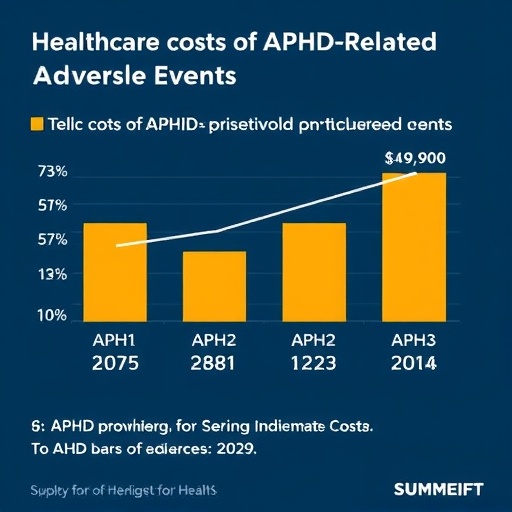In a groundbreaking study published in Advances in Therapy, researchers led by Schein et al. reveal the staggering healthcare costs associated with adverse events in pediatric patients diagnosed with Attention-Deficit/Hyperactivity Disorder (ADHD). The study, leveraging extensive claims data, highlights a critical and often overlooked aspect of ADHD management — the economic burden that adverse events impose not only on families but also on the healthcare system at large.
Attention-Deficit/Hyperactivity Disorder is a neurodevelopmental condition that affects millions of children worldwide. Characterized by symptoms such as inattention, hyperactivity, and impulsivity, ADHD often requires complex and multifaceted treatment plans which may include behavioral therapies and pharmacological interventions. While these treatments can be effective in managing symptoms, they are not without risk — adverse events can and do occur. The new research sheds light on the frequency of these incidents and their significant financial implications.
The research utilized a claims-based approach to analyze data from an extensive population of pediatric patients diagnosed with ADHD. The study revealed that children with ADHD are at a markedly increased risk for negative health outcomes, which in turn lead to elevated healthcare expenditures. These additional costs emerge from various factors, including emergency room visits, hospitalizations, and the need for specialized interventions to manage adverse events.
When considering the broad array of potential adverse events linked with ADHD treatments, the findings indicate that not all complications are directly attributable to the medications prescribed. Some adverse events stem from environmental factors, including school-related issues and social challenges that children with ADHD may encounter. These multifaceted origins of adverse events complicate the issue and underline the necessity for a comprehensive approach to ADHD management.
The stratification of costs highlighted by Schein et al. underscores the different types of healthcare resources consumed in treating these adverse outcomes. The data revealed that the average spending on children who experience adverse events is significantly higher than those who do not face such complications. This disparity emphasizes the vital need for early intervention and ongoing monitoring of ADHD patients, aiming to mitigate the risks associated with treatments and improving overall health outcomes for vulnerable pediatric populations.
Notably, the implications of this research extend far beyond individual cases. The findings present a formidable challenge to healthcare systems already under pressure. As the prevalence of ADHD continues to rise, healthcare providers and policymakers must recognize the comprehensive cost implications associated with this disorder. Developing strategies to manage these costs effectively is crucial, not only to alleviate the financial burden on families but also to enhance the allocation of resources within the healthcare system.
The study advocates for more targeted educational programs designed for both parents and healthcare providers. By increasing awareness of the potential adverse events associated with ADHD treatments, stakeholders can better prepare families for the challenges they may face. Such preparation could lead to more informed decisions regarding treatment options, thereby potentially reducing the frequency and severity of adverse events.
Furthermore, Schein et al.’s research raises important questions regarding current ADHD treatment protocols. Are there adequate monitoring systems in place to identify and address adverse events promptly? The findings suggest that a more inclusive framework for ADHD care is necessary; one that not only emphasizes pharmacological interventions but also incorporates behavioral therapies and psychosocial support systems.
Advancements in technology also offer promising avenues for improving ADHD care. Digital health tools, including mobile applications and telehealth, can facilitate real-time monitoring of young patients. These platforms could enable parents and healthcare providers to track symptoms and side effects more effectively, allowing for timely interventions when adverse events occur. This proactive approach not only promotes patient safety but could also translate into reduced healthcare costs in the long run.
As awareness of the study spreads, it is critical for academic and research institutions to foster collaborations that further investigate the economic impact of ADHD. By establishing longitudinal studies that track healthcare costs over time, researchers can gather more conclusive evidence regarding the financial burden of ADHD and the associated adverse events in children. This data would be invaluable in shaping future policies and practices aimed at improving outcomes for youth with ADHD.
Beyond the financial implications, the human aspect of this research cannot be understated. Adverse events related to ADHD treatments can lead to emotional distress for both the affected children and their families. The psychological burden associated with managing these complications can compound the already significant challenges ADHD patients face, including academic struggles and social isolation. Addressing these dimensions is of paramount importance in developing a truly holistic approach to ADHD care.
In conclusion, Schein et al.’s research underscores a critical intersection of healthcare costs and adverse events in pediatric ADHD patients. The findings not only illuminate the substantial economic implications but also serve as a clarion call for improved practices in ADHD management. As stakeholders in healthcare, including clinicians, policymakers, and families, rally around these findings, the hope is that collaborative efforts will lead to innovative solutions that enhance the quality of care for children with ADHD, ultimately improving their health outcomes and financial burdens.
Subject of Research: Healthcare Costs Associated with Adverse Events in Pediatric Patients with ADHD
Article Title: Healthcare Costs Associated with Adverse Events in Pediatric Patients with Attention-Deficit/Hyperactivity Disorder (ADHD): A Claims-Based Study
Article References:
Schein, J., Catillon, M., Lemyre, A. et al. Healthcare Costs Associated with Adverse Events in Pediatric Patients with Attention-Deficit/Hyperactivity Disorder (ADHD): A Claims-Based Study. Adv Ther (2025). https://doi.org/10.1007/s12325-025-03345-x
Image Credits: AI Generated
DOI: 10.1007/s12325-025-03345-x
Keywords: ADHD, healthcare costs, adverse events, pediatric patients, claims-based study, neurodevelopmental disorders, mental health.




